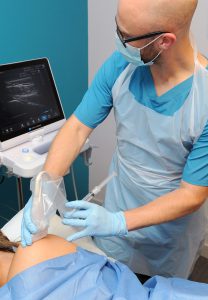By Stewart Kerr Advance Practice Physiotherapist.
Frozen shoulder, also known as adhesive capsulitis, is a condition that causes pain and stiffness in the shoulder, making it difficult to move the joint. The condition is characterised by the thickening and tightening of the capsule around the shoulder joint, leading to decreased mobility and range of movement.
One treatment option for frozen shoulder is hydrodistension, also known are capsular distension, distension arthrogram and high volume distension. Hydrodistension is a procedure that uses a large volume of sterile water to stretch the capsule around the shoulder joint. The procedure is performed under ultrasound guidance and local anaesthesia, and the water is slowly injected into the capsule through a small needle. A small amount of steroid is also added to help reduce inflammation.
The pressure of the water stretches the capsule, which helps to break up the adhesions and scar tissue that are causing the stiffness and pain. The procedure can also help to increase blood flow to the area, which can promote healing and reduce inflammation.

Hydrodistension is a relatively quick procedure, typically taking about 10-20 minutes to complete, however for 60 minutes is allowed to conduct a full assessment and scan prior to the procedure. The procedure is performed as an outpatient procedure, meaning that you can go home the same day. After the procedure, patients will be given specific exercises to do at home to help regain their range of movement and strength.
One of the benefits of hydrodistension is that it does not require any incisions or cuts, just a small injection needle. This makes it a great option for patients who may not be candidates for more invasive procedures such as surgery.
Another benefit of hydrodistension is that it has been shown to be effective in reducing pain and stiffness in the shoulder and improving range of movement. In a study of 100 patients with frozen shoulder, 93% of patients reported significant improvement in their pain and range of movement after hydrodistension.
It’s important to keep in mind that hydrodistension is not suitable for everyone. Patients with certain medical conditions, such as blood clots or heart conditions, may not be candidates for the procedure. It’s important to discuss with our injecting clinicians if hydrodistension is the right option for you.
In conclusion, hydrodistension is an effective injection treatment option for patients with frozen shoulder. The procedure can help to reduce pain and stiffness and improve range of movement, allowing patients to return to their normal activities and improve their quality of life. If you are suffering from frozen shoulder, discuss hydrodistension with us today as a potential treatment option.












